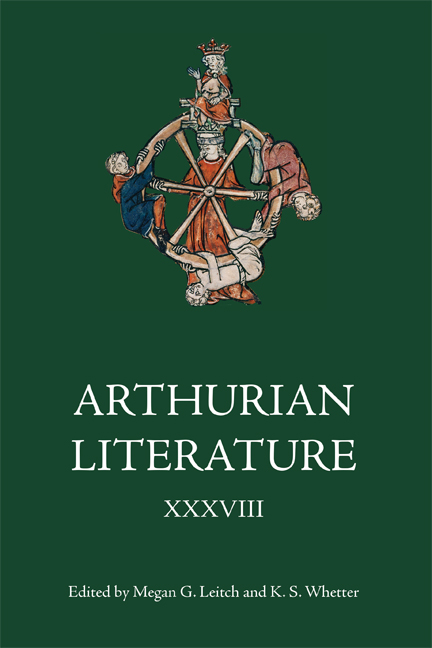Book contents
- Frontmatter
- Contents
- List of Figures and Tables
- Note on the Derek Brewer Prize
- General Editors’ Preface
- List of Contributors
- List of Abbreviations
- 1 The Inaugural Derek Brewer Essay Prize: Animals at the Feast: Strange Strangers and Courtly Power in The Wedding of Sir Gawain and Dame Ragnelle
- 2 The Kindred of a Boy without a Father: Merlin’s British Forebears and Irish Cousins
- 3 Geoffrey of Monmouth’s Subtle Subversion: Active Double- Voiced Discourse in the Historia regum Britanniae
- 4 ‘Cornwall, up in the North’: Geography and Place Names in the Source of the Old Icelandic Brut
- 5 Enacting Arthurianism in the Order of the Garter and Sir Gawain and the Green Knight
- 6 Deviants and Dissenters: Theorizing Shame and Punishment in Malory’s Morte
- 7 Loyalty and Worshyp in Conflict in Malory’s Lancelot
- 8 Emotional Inheritance in Malory’s Morte Darthur: Shame and the Lott–Pellinore Feud
- 9 Navigating and Indexing Arthurian Romance in Benoît Rigaud’s Edition of Lancelot du Lake (1591)
- 10 ‘A great many strange puppets’: Queen Caroline, Merlin’s Cave, and Symbolic Arthurianism in the Age of Reason
- 11 How Galahad Regained his Virginity: Dead Women, Catholicism and the Grail in Nineteenth-Century British Poetry
- Notes
- Miscellaneous Endmatter
3 - Geoffrey of Monmouth’s Subtle Subversion: Active Double- Voiced Discourse in the Historia regum Britanniae
Published online by Cambridge University Press: 10 January 2024
- Frontmatter
- Contents
- List of Figures and Tables
- Note on the Derek Brewer Prize
- General Editors’ Preface
- List of Contributors
- List of Abbreviations
- 1 The Inaugural Derek Brewer Essay Prize: Animals at the Feast: Strange Strangers and Courtly Power in The Wedding of Sir Gawain and Dame Ragnelle
- 2 The Kindred of a Boy without a Father: Merlin’s British Forebears and Irish Cousins
- 3 Geoffrey of Monmouth’s Subtle Subversion: Active Double- Voiced Discourse in the Historia regum Britanniae
- 4 ‘Cornwall, up in the North’: Geography and Place Names in the Source of the Old Icelandic Brut
- 5 Enacting Arthurianism in the Order of the Garter and Sir Gawain and the Green Knight
- 6 Deviants and Dissenters: Theorizing Shame and Punishment in Malory’s Morte
- 7 Loyalty and Worshyp in Conflict in Malory’s Lancelot
- 8 Emotional Inheritance in Malory’s Morte Darthur: Shame and the Lott–Pellinore Feud
- 9 Navigating and Indexing Arthurian Romance in Benoît Rigaud’s Edition of Lancelot du Lake (1591)
- 10 ‘A great many strange puppets’: Queen Caroline, Merlin’s Cave, and Symbolic Arthurianism in the Age of Reason
- 11 How Galahad Regained his Virginity: Dead Women, Catholicism and the Grail in Nineteenth-Century British Poetry
- Notes
- Miscellaneous Endmatter
Summary
The ambiguity of Geoffrey of Monmouth's Historia regum Britanniae is well attested: even scholars who perceive a clear literary or political motivation behind Geoffrey's work cannot deny the text's ambivalence. This ambiguity arises in part from the little known of Geoffrey's own ethnicity and affiliations – it is disputed whether he was Welsh, Breton, Norman, or held some variation of ‘hybrid identity’. Additional uncertainty emerges from Geoffrey's complex patronage. Though the HRB's dedications consistently reference Robert Earl of Gloucester, the half-brother of the Empress Matilda, at different times it was also dedicated to Waleran Count of Meulan and Stephen of Blois.3 Furthermore, ambiguity permeates the HRB itself through its ‘multiple appeal’: the text seems simultaneously to celebrate the accomplishments and heroes of a British or Welsh past and validate the, by then, firmly established Norman rule in England. Finally, some scholars suggest that Geoffrey's ambiguity results from his use of parody, satire, and irony. However, the HRB's ambivalence is intentionally rendered through a rhetorical practice even more complex. By close-reading key moments of ambiguity relating to imperial ambitions throughout the HRB, I argue that Geoffrey employs what Mikhail Bakhtin refers to as ‘active double-voiced discourse’, in which a discernible voice in the text defensively responds to an unheard second voice, undermining the confidence of the original voice and rendering it ambiguous. Through his calculated use of active double-voiced discourse, Geoffrey questions the legitimacy of conquest within the narrative and possibly, by extension, the legitimacy of the Norman invasion of Wales underway in his own day.
Scholars focusing on the political dimensions of the HRB have both recognized and attempted to explain the text's ambiguity. Aligning with scholars such as Michelle R. Warren and Carol A. N. Martin, I conceive of Geoffrey's ambiguity not as a conscious tool for validating Norman interests and a colonial agenda, as suggested by scholars such as Michael Faletra, but as a reflection of more critical, even subversive, motivations. Whereas Warren applies a postcolonial lens to the HRB, concluding that the text ‘engenders its own indeterminacy as a discursive strategy of power and resistance’,11 Martin focuses on Geoffrey's use of irony, suggesting that it functions to caution Geoffrey's contemporaries against ‘regal ambition’ and ‘the obviously impending civil war’.
- Type
- Chapter
- Information
- Arthurian Literature XXXVIII , pp. 48 - 80Publisher: Boydell & BrewerPrint publication year: 2023



